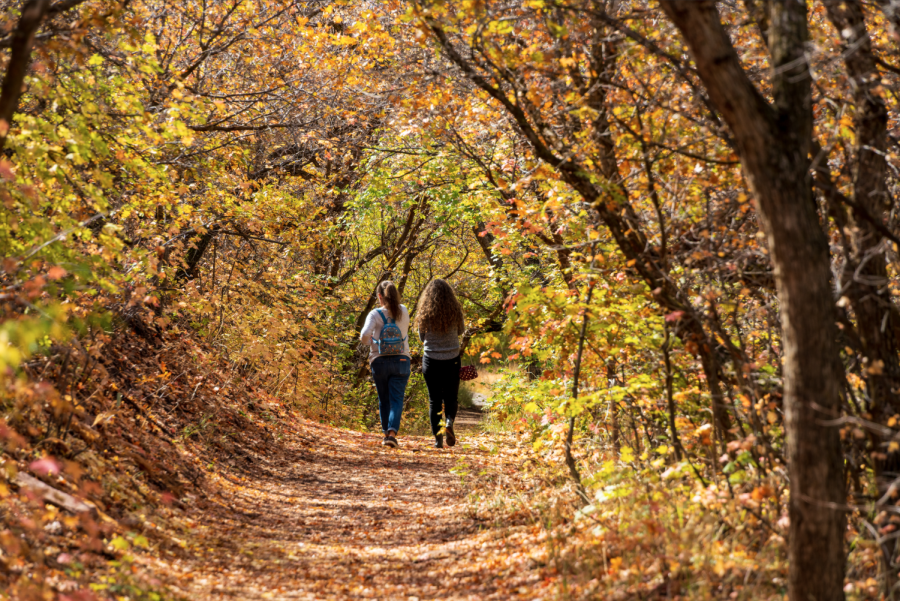Shadley: The U Should Facilitate More Outdoor Opportunities for Students
Two hikers on a trail by Red Butte Creek in Salt Lake City, Utah, on October 13th, 2021. (Photo by Xiangyao “Axe” Tang | The Daily Utah Chronicle)
October 14, 2021
Over the past year, we’ve jumped from a semester almost entirely online to a semester where we spend most days on campus. The former forced us to remain tethered to technology, blurring the lines between work, school and leisure. However, it came with some advantages.
One of the things I miss most about working and learning from home is the additional free time. Although, the ever-present obligation and ability to work robs us of our ability to both enjoy and focus on the things we do in our free time. Nonetheless, a work-from-home lifestyle allowed me to spend more time outdoors, in nature, than I’m able to now.
Time spent in nature has various psychological and physiological benefits that allow each of us to do better at work or school, but more importantly, it helps us find more joy and fulfillment in life. As we continue to move back to a traditional academic experience, the University of Utah should provide students with ample opportunities to spend time in nature.
Time spent outdoors helps us connect with nature, one another and our work. I spoke with David Strayer, professor of psychology at the U, to learn more about how time spent outdoors can have a transformative effect on our mental health and cognitive abilities.
One of the most important benefits we receive from time spent outside is attention restoration. Strayer said that students are “constantly remembering the 18 or 20 different things [they’ve] got to juggle” and how that can reduce our focus and attention. Of course, part of the reason we’re constantly remembering those things is because our phones, laptops and other devices repeatedly pop up with notifications urging us to think about everything we’re juggling. Those cognitively stifling reminders are “one of the reasons why when people set the technology aside for a little bit, you see these bursts of creativity.”
Strayer emphasized the importance of simultaneously disconnecting from technology and connecting with nature. Doing so will “reduce the student’s stress and make them think more clearly.”
Strayer teaches a class called “Cognition in the Wild” where he puts his research into practice. During the semester he takes his class down to southern Utah and they spend a weekend camping and hiking in the desert. He told me a story about how he used to always require presentations in the course be done in the classroom.
For the first several years, they were just in-class PowerPoint presentations, and they were, as Strayer put it, “horrible.” Over the years, he’s pivoted to having students share their presentations during the trip, seated around the campfire, without any technological aid. The quality of the presentations rose dramatically.
Not only did the quality of students’ work improve with more time spent outside, but their mental health appeared to improve. Strayer has countless stories of students, largely disconnected from their peers, finding a sense of community for the first time through the class, one of the reasons why Strayer’s classes continue to meet even after the semester’s end.
While Strayer’s class serves as an example of how time spent outdoors can improve the academic experience for students, his class is far from the norm.
While the U has a whole host of mental health resources, there has been minimal emphasis put on facilitating time spent outdoors. Like Strayer, I think that we “don’t have enough outdoor classrooms on campus.” Unsurprisingly, classes outside help students be more attentive and focused in class.
To make outdoor learning a possibility, the U should design outdoor spaces with adequate seating, shade and then encourage professors to teach weather permitting. Some of this work can be done by modifying existing outdoor spaces, so students can opt to study outside.
While increasing our amount of outdoor time will help restore attention and decrease stress, we can’t fully disconnect from technology and our stressors in the classroom. The U should include a few mental health days each semester, where students are encouraged to get outdoors and unplug from technology.
Keeping up with all the responsibilities of a university student can be mentally and physically taxing, especially when those responsibilities get in the way of doing the things that boost our mental and physical health, like going outside.
The U should help students spend more time in nature in and out of the classroom. Doing so would not only benefit the student’s health and wellbeing, but it would also improve our ability to succeed at the U.









Sara • Oct 19, 2021 at 1:59 pm
I totally agree, There are some students who don’t have cars. It would be great if the school make some plans to rent a bus for a day and take students for short trips and camping.